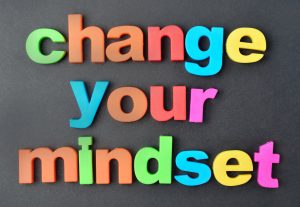
Many people who competently write articles, blogs, and marketing copy, and who claim extraordinary expertise in their field, find themselves paralyzed when they contemplate writing a book. The problem is, they think they have to write THE book.
What does THE book mean? Generally, it means some variation on “It has to be perfect.” It has to be insightful, comprehensive, well-crafted and error-free.
Let’s see if we can change your writing mindset by reframing these expectations.
THE book wows every reader with insight.
Of course you’d love to have readers Oohing and Ahing over how much they learned or what revelations your book gave them. But if there’s nothing new under the sun, how can you possibly accomplish the Big WOW?
It’s true, especially for nonfiction, that readers often already know many of the things they’re reading. Think about self-help or leadership books you’ve read—how many times have you thought, “That’s just common sense!” But to keep good ideas top of mind so we can use them, we need to be reminded of them periodically. And, a few people might be reading about your topic for the first time or at just the right time and in the right situation. By providing even familiar points in fresh language, they will resonate with a particular subset of readers who will have that Aha experience.
A book reinforces important points and offers insight to the right people at the right time.
THE book is a comprehensive fount of knowledge.
OMG I only have one chance to write my book so goldarnit I’m going to shove everything I know into it! It has to contain EVERYTHING.
STOP! BREATHE! Aaahhhh.
Now, unless you’re writing a textbook that truly does need to be comprehensive, do NOT try to include everything you know. Overloading your readers will cause them to tune out. Focus your book content by drawing boundaries—what’s in, and what’s out? And even within the boundaries, you will likely have too much content. Use leftover stories, examples, tips, and tidbits as part of related presentations, workshops, articles, or interviews on the topic. Later, if you do find content you wish you’d included, there are always 2nd editions. And if you have enough information, write books two, three, and four!
A book is focused and manageable for the reader (and it may be the first in a series…).
THE book is a beautifully crafted work of art.
When I first began skiing, I was shocked (shocked, I say!) that I couldn’t schuss down the run like the athletes I watched on TV. For Pete’s sake I could barely keep my tips from crossing, and heaven forbid you got in my way if I picked up any speed because I sure didn’t know how to stop. It was off to ski school and the bunny hill for me. I had to do my share of falling (look out—yard sale!) before I could figure out how to stay up.
Most of us are not prodigies. We can’t slalom on our first run. We can’t sit down at the piano and play without practice. We can’t write brilliantly without knowing the ABCs and basic grammar. We usually need someone to teach us new skills, and we can’t improve them unless we start practicing.
To learn the craft of writing a book, take a class, join a writing group, or hire a writing coach. Lessons and feedback along the way will improve your writing skill. Regardless of your skill level, a qualified editor can help you ensure consistency and correct errors. When you finish your book, you’ll understand more about the process and, as a result, know more about how to improve your next book.
A book is well written and knowledgeably edited—and positions you for an even better next book.
Once you change your mindset to realize you don’t have to be perfect—you don’t have to write THE book—especially the first time out, the pressure comes off and you can let the ink flow.

